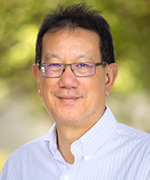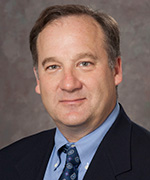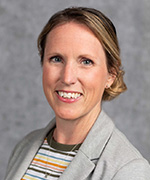About Us
Leadership
 Ted Wun, M.D., FACP (Research Profile)
Ted Wun, M.D., FACP (Research Profile)
Ted Wun is the director and MPI of the UC Davis Clinical and Translational Science Center. He is also associate dean for clinical and translational research and serves as MPI of the California Cancer Reporting and Epidemiologic Surveillance (CalCARES) program, which manages the California Cancer Registry. In his role as associate dean for research, he is responsible for expanding high-impact, interdisciplinary research, with a focus on clinical research broadly defined.
Wun is professor of medicine and pathology/laboratory medicine, and chief of the Division of Hematology and Oncology. He is an active clinician, and his research is in sickle cell disease, and thrombosis with a focus on cancer-associated venous thromboembolism.
 Nicholas Kenyon, M.D., M.A.S. (Research Profile)
Nicholas Kenyon, M.D., M.A.S. (Research Profile)
Nick Kenyon is an associate director and MPI of the UC Davis Clinical and Translational Science Center, director of the CTSC Workforce Development for Investigators program, and director of the ICorps@NCATS program at UC Davis. A graduate of the CTSC Mentored Clinical Research Training Program and prolific collaborator on innovative research and development projects, Kenyon was also the recipient of a career development award to study the effects of nitric oxide in models of airway inflammation and this work translated into an FDA new drug application and clinical trial to study L-arginine in adult severe asthma. He is the co-principal investigator on an NCATS U18 RADx SCENT (Kenyon, Davis) proposal to define breath signatures of COVID-19 and bring breath sensors to market.
Kenyon is professor and division chief of Pulmonary, Critical Care, and Sleep Medicine. His clinical interests focus on asthma, chronic obstructive pulmonary disease (COPD), environmental health, non-invasive markers of airway disease and critical care. His research interests are in airway diseases and lung injury. As a physician-scientist and co-director of the UC Davis Asthma Network (UCAN) clinics with a research interest in adult severe asthma, he and his laboratory staff and are working to develop the next medications to improve the care of all patients with severe asthma.
 Courtney Lyles, Ph.D. (Research Profile)
Courtney Lyles, Ph.D. (Research Profile)
Courtney Lyles is an associate director and MPI of the UC Davis Clinical and Translational Science Center, director of the Center for Healthcare Policy and Research (CHPR), and professor in the Department of Public Health Sciences at UC Davis.
Lyles is a trained health services researcher who studies quality of care, health behavior and health outcomes. Her research focuses on harnessing health information technology to improve chronic disease management. She has worked on digital health design and testing, evaluation and implementation, from topics such as diabetes and hypertension to referrals to community-based health and social resources.
 Angela Griffiths, Ph.D.
Angela Griffiths, Ph.D.
Angela Griffiths is Chief Administrative Officer of the CTSC. She oversees finance, facilities, contracts, agreements, marketing, operations, and the staff who support the various programs that the CTSC furnishes. In this role, she serves on a variety of leadership, research, and compliance committees and is a local representative to the national CTSA consortium for administrative functions.
Griffiths graduated with honors from Walden University with a Ph.D. in health psychology and from California State University, San Marcos, with a master’s degree in experimental psychology, and has recently completed multiple leadership programs at UC Davis. Her professional background reflects nearly 20 years in research administration, program management, communications, consulting and grantsmanship. She has worked in the UC system since 2011, transferring from the UC San Diego Altman Clinical and Translational Research Institute as the research communications director to lead the CTSC’s Clinical Trials Office education and training programs prior to stepping in to this role.
Bradley Pollock, Ph.D., M.P.H. (Research Profile)
Bradley Pollock serves as co-director of the CTSC Biostatistics, Epidemiology, and Research Design Program and is Rolkin Chair of the Department of Public Health Sciences, as well as a distinguished professor of Epidemiology. He is also the Principal Investigator of the Children’s Oncology Group National Cancer Institute Community Oncology Research Program (NCORP) Research Base, a $40 million grant supporting a network of almost all North American cancer treatment sites devoted to childhood and adolescent cancer research. Pollock is a leading researcher on the epidemiology and control of childhood and adolescent cancers. He has also been in leadership roles for the National Institutes of Health-sponsored Clinical Translational Science Award Consortium.
Sandra “Sandy” Taylor, Ph.D. (Research Profile)
Sandra Taylor oversees daily operations of the CTSC Biostatistics, Epidemiology, and Research Design Program. In this role, she allocates requests for statistical assistance to CTSC biostatisticians, educates investigators about biostatistics and its role in biomedical research, and seeks to improve the research quality by promoting greater integration of statistics into project planning and execution. Taylor earned her doctorate degree in Biostatistics from the University of California, Davis and also holds a master's degree in Zoology and Physiology.
Daniel Nishijima, M.D., M.A.S. (Research Profile)
Daniel Nishijima is a professor of emergency medicine and the medical director of the CTSC Clinical Research Center. He is also medical director and a CTSC Hub Liaison for the CTSA Trial Innovation Network. His research involves the treatment and management of injured patients and patients with neurological emergencies. He has extensive experience leading multicenter clinical trials and studies in regional and national consortiums.
Christopher Kain, R.N., M.S.N., C.N.L.
Christopher Kain serves as associate director of the CTSC Clinical Research Center. He is also a member of the UC Davis Institutional Review Board (IRB) and the Translational Research Integration Compliance Committee (TRICC). Kain previously served as an administrative nurse manager in the Department of Radiation Oncology and clinical nurse in the GI Lab at UC Davis Health. He also has a B.S. in Business and vast experience with different companies as a manager and business owner.
Kari Allen
Kari Allen is the director of the Clinical Trial Management System Operations Office. She has her master’s in healthcare administration and is from South Florida. She is a Certified Research Administrator and has been in the research administration and clinical trial space for over 30 years. She spent most of her career at the University of Miami Miller School of Medicine (UMSOM) and, most recently, at Dartmouth Health. While at UMSOM, Kari implemented a Shared Service team bringing Sponsored Programs Research Administration (pre and post-award), and Clinical Trial Administration together to serve the School of Medicine.
Suzan Bruce
Suzan "Suzie" Bruce is associate director of the Clinical Trial Management System Operations Office. She is originally from the Sacramento area. She has worked in healthcare for over 30 years with a background in accounts receivable, compliance, certified coder, Medicare policy analyst, and clinical trials analyst. For the last 12 years, Suzie has been at UC Davis in the Clinical Trials Office, developing coverage analysis processes and, more recently, leading the Clinical Trials Office Finance Team, developing tools and processes for Start Up.
Sergio Aguilar-Gaxiola, M.D., Ph.D. (Research Profile)
Sergio Aguilar-Gaxiola is the director of the CTSC Community Engagement Program. He also directs the Center for Reducing Health Disparities and is a professor of clinical internal medicine. He serves as Co-director of the Latino Aging Research Resource Center and the Community Outreach and Engagement Core of the UC Davis Environmental Health Science Center. He is an internationally renowned expert on mental health in ethnic populations and is the recipient of multiple national awards for his work. He is principal investigator of the Mexican American Prevalence and Services survey, the largest mental health study conducted in the U.S. on Mexican Americans, and is the coordinator for Latin America and the Caribbean in the World Health Organization (WHO) Mental Health survey. In this capacity, he coordinates the work of the National Mental Health Institute surveys in Mexico, Columbia, Brazil, Peru, Costa Rica and Portugal. Aguilar-Gaxiola is co-chair of the CTSA Collaboration/Engagement Domain Task Force Lead Team. He is an author of the “Principles of Community Engagement” book and member of the External Advisory Boards of 7 CTSAs.
Kathleen Angkustsiri, M.D., M.A.S. (Research Profile)
Kathleen Angkustsiri is co-director of the Integrating Special Populations into Research Program within the Community and Collaborator Engagement Program.
Angkustsiri is a developmental-behavioral pediatrician with interests in neurodevelopmental disabilities including autism, chromosome 22q11.2 deletion syndrome (22q11.2DS), down syndrome, and fragile X syndrome (FXS). She completed her B.A. in Psychology and Human Biology at Stanford University and received her M.D. from New York University School of Medicine. She is involved in research on immune dysfunction and GI conditions in autism, behavioral characteristics of children with 22q11.2DS, and clinical trials in autism, FXS, and down syndrome.
Martin Cadeiras, M.D. (Research Profile)
Martin Cadeiras is the co-director of the CTSC Community Engagement Program. He is a professor and medical director of the UC Davis Health Heart Failure, Heart Transplantation, and Mechanical Circulatory Support Program. Cadeiras also serves as the director for the T32 Training Program in Basic and Translational Cardiovascular Science, and a co-director for the UC Davis Cardiovascular Research Institute (CVRI). He serves as a member of the Organizer Committee for the UC Davis Heart Failure Summit, an annual symposium to share best practices in Heart Failure Care paired with UC Davis Heart Research Day were fellows and faculty share their progress in cutting edge research at UC Davis and collaborating Institutions.
Cadeiras has over 15 years of clinical and translational research experience in the field of heart failure, and in his current role, leads a robust, multidisciplinary program that serves the needs of a broad population of cardiovascular disease patients and families. He has developed close and long-lasting collaborations with mathematicians, computer scientists, and engineers to design novel solutions to address the complex issues faced by the most vulnerable patients in communities through enabling patient-centered, network-based community health interventions. Working together they developed novel approaches to understand cardiovascular disease from neighborhood environments to molecular phenotypes.
Theresa Keegan, Ph.D., M.S. (Research Profile)
Theresa Keegan is a cancer epidemiologist with primary research interests in studies of cancer outcomes and cancer survivorship. She has undertaken numerous studies with population-based cancer registry data in the United States, both alone and linked to other administrative and clinical databases, to understand patterns of cancer treatment and outcomes. Keegan has also been involved with multiple studies examining patient experiences with cancer and patient-reported outcomes after cancer diagnosis. A focus of her research is in adolescent and young adult (AYA) oncology where her research has documented sociodemographic differences in stage at diagnosis, treatment, access to specialized cancer center care, late effects and survival.
Oanh Meyer, Ph.D., M.A.S. (Research Profile)
Oanh Meyer is co-director of the Integrating Special Populations into Research (INSPIRE) Program within the CTSC Community and Collaborator Engagement Program. She is an associate professor in the Department of Neurology at the UC Davis School of Medicine. She also leads the research education component at the UC Davis Alzheimer’s Disease Research Center.
Meyer received her Ph.D. in social psychology and her Masters in Advanced Study in Clinical Research at UC Davis. Her current research interests include social determinants of cognitive decline associated with Alzheimer’s disease and related dementias (ADRD), and culturally appropriate dementia caregiving interventions. She has a particular interest in reducing ADRD for older adults and their family caregivers. She has been continuously funded by the National Institute on Aging and the Alzheimer’s Association for her work on dementia and dementia caregiving in ethnic populations.
Silvia Molina, M.P.H.
As the Community and Collaborator Engagement Program Staff Co-Manager, Silvia collaborates with staff and faculty directors on various projects and deliverables. She interfaces with staff managers in other CTSC programs, community engagement professionals across the university, and the Clinical and Translational Science Awards (CTSA) network nationally, supporting knowledge sharing, capacity building, and scientific collaborations between researchers and communities.
Prior to joining the CTSC, Silvia was the Community Education Specialist at the UC Davis Comprehensive Cancer Center, and she worked for over 16 years at a local nonprofit where she built and nurtured business relations, directed grants administration, and coordinated program development for underserved populations.
Silvia has experience leading and being on various advisory councils and boards in the field of Gerontology. Silvia earned a bachelor’s degree in Gerontology and a master’s in Public Health with an emphasis on Health Promotion, Policy, and Leadership from California State University, Sacramento.
Julie Schweitzer, Ph.D. (Research Profile)
In addition to serving as co-director of the Adolescent and Young Adult Program within the Community and Collaborator Engagement Program, Julie Schweitzer also serves as director of the Mentoring Academy for Research Excellence (MARE) and the Mentored Clinical Research Training Program, and co-director of the TL1 program. She is a professor of psychiatry and behavioral sciences, a faculty member in the Medical Investigations in Neurodevelopmental Disorders (MIND) Institute, and a clinical psychologist and neuroscientist.
Schweitzer has expertise in translational research in neurodevelopmental disorders, particularly in the field of attention-deficit/hyperactivity disorder (ADHD) and the application of learning theories to clinical populations.
Vanessa Trujillo, M.P.H.
Vanessa Trujillo is the Community and Collaborator Engagement Program Staff Co-Manager. Vanessa understands the significant role community engagement plays and brings extensive experience to clinical and translational sciences. Prior to joining the UC Davis team, Vanessa spent four years as an Operations Analyst at the University of California, San Francisco’s (UCSF’s) Clinical and Translational Science Institute (CTSI) where she provided support for special ad hoc assignments. Projects ranged from measuring the impact of UCSF’s clinical research infrastructure and services in accelerating scientific discoveries and across public health initiatives to providing network and resources to community partners.
Vanessa has a Health Science B.S degree from Saint Mary’s College of California and a Master of Public Health degree with an emphasis on health care policy, leadership, and research from the University of San Francisco.
Nicholas ("Nick") Anderson, Ph.D. (Research Profile)
Nicholas Anderson is the director of the CTSC Biomedical Informatics Program. An accomplished researcher with private industry and academic experience, he is the Robert D. Cardiff Professor of Informatics in the Department of Public Health Sciences and the director of research informatics for UC Davis School of Medicine. His research and academic expertise encompass clinical-translational data sharing, patient-centered health research, and bioethics policy issues. His recent work has focused on development of institutional-scale biospecimen and data repository resources for research, and he is actively engaged in advancing these areas across UC Davis and other University of California campuses.
Anderson is an experienced academic mentor, with a primary goal of supporting students who seek to improve the quality of health and health information in society. He expects his mentees to become skilled writers, critical thinkers, and socially active academic citizens who take personal responsibility and seek perspective by cultivating balance in their lives.
Kent Anderson, M.S.
Kent Anderson is the associate director of the CTSC Biomedical Informatics Program. His responsibilities include oversight of informatics research at UC Davis Health. He serves a key role in building extensive interactions between the CTSC Informatics Program and other CTSA programs and in representing UC Davis in the Statewide UC-ReX organization.
Anderson is charged with facilitating the integration of research technology within UC Davis Health, including health data re-use, secure research infrastructure provision, and development of population health datasets. He is responsible for directing the design, acquisition, development, and implementation of specialized databases, tools, and applications to support clinical and translational research at UC Davis. In addition, he serves as a representative to the national consortium of CTSA award recipients to develop resources to benefit all represented CTSA institutions. He works closely with the Biomedical Informatics Program director to help investigators make the most efficient use of informatics services and resources.
Kate Marusina, Ph.D., M.B.A.
Kate Marusina serves as Resources & Services staff program manager. In this role, she develops university-wide programs to streamline and improve clinical research processes. Her team provides principal investigators and staff with logistical support for clinical trials, budgeting and billing assistance, monitoring of investigator-initiated trials, and training and education opportunities. She developed several programs aimed at improving the transition of new products from bench to bedside via industry alliances or regulatory support and she published several peer-reviewed publications and book chapters.
Prior to UC Davis, Marusina was a part of the Business Development Group at Novozymes A/S, Denmark She has experience in product licensing, product development and global strategy, forecasts, marketing materials and sales training.
Daniel Nishijima, M.D., M.A.S. (Research Profile)
Daniel Nishijima is a professor of emergency medicine and the medical director of the CTSC Clinical Research Center. He is also medical director and a CTSC Hub Liaison for the CTSA Trial Innovation Network. His research involves the treatment and management of injured patients and patients with neurological emergencies. He has extensive experience leading multicenter clinical trials and studies in regional and national consortiums.
Staff and Investigator WFD teams
Stephen G. Henry, M.D., M.Sc. (Research Profile)
Stephen Henry is associate director of the CTSC Mentored Clinical Research Training Program (MCRTP). He also has an appointment at the Sacramento VA Medical Center with a focus on mentoring clinical researchers. Henry is a general internist and primary care physician who does clinical and health services research in two main areas: (1) analyzing patient-clinician communication developing interventions that improve patient outcomes and quality of care through improving patient-clinician communication. Most of his projects in this area focus on communication about opioids and chronic pain. (2) opioid epidemiology and policy research. He has led several federally-funded research projects analyzing California’s prescription drug monitoring program data and evaluating opioid overdose prevention efforts in California. Other research interests include methods for analyzing patent-clinician interaction, pain management in primary care, treatment of opioid use disorder, and medical epistemology.
James Holmes, M.D., M.P.H. (Research Profile)
James Holmes is co-director of the CTSC KL2 Research Training Program in collaboration with Leigh Ann Simmons. As professor and vice chair for research in the Department of Emergency Medicine, his research interests include the initial evaluation and management of injured patients, with a particular focus on injured children.
Holmes is active in the Emergency Care Translational Research Collaborative (ECTRC), a group of emergency medicine researchers at sites with Clinical Translational Science Awards (CTSAs). The collaborative’s objective is to conduct high quality multicenter research focused on important emergency medicine issues. He is also a recipient of the UC Davis Dean's Mentoring Award.
Kate Marusina, Ph.D., M.B.A.
Kate Marusina serves as Workforce Development for Research Staff Program Manager. In this role, she develops university-wide programs to streamline and improve clinical research processes. Her team provides principal investigators and staff with logistical support for clinical trials, budgeting and billing assistance, monitoring of investigator-initiated trials, and training and education opportunities. She developed several programs aimed at improving the transition of new products from bench to bedside via industry alliances or regulatory support and she published several peer-reviewed publications and book chapters.
Prior to UC Davis, Marusina was a part of the Business Development Group at Novozymes A/S, Denmark She has experience in product licensing, product development and global strategy, forecasts, marketing materials and sales training.
Valentina Medici, M.D., M.A.S., FAASLD (Research Profile)
Valentina Medici is the principal investigator and director of the CTSC TL1 Clinical and Translational Research Training Program. She is the Fred and Pat Anderson Endowed Professor in Liver Research and Vice Chair for Research in the Department of Internal Medicine, and professor in the Division of Gastroenterology and Hepatology. Her research focus is the epigenetic regulation of gene expression in Wilson disease and the study of metabolic liver diseases, including non-alcoholic fatty liver disease, working on mouse models of liver diseases. Medici also conducts and collaborates with industry-funded and investigator-initiated clinical trials and translational studies in liver diseases. Medici is a graduate of the CTSC Mentored Clinical Research Training Program and a member of the Education Leadership Committee of CTSC educational programs.
Rachel Reeves, Ph.D.
Rachel Reeves is the Workforce Development for Investigators Staff Program Manager. She came to this role through her work in researcher career development, most recently directing UC Davis CTSC's NIH-funded FUTURE career development program which served 400 active participants at its height.
Reeves previously developed and managed the UC Davis Mellon Public Scholars Program, placing Ph.D. researchers in consulting roles with non-profits and state agencies. She has written policy papers for the UC Davis Center for Poverty Research, consulted for Congressman John Garamendi’s Rural Grants Initiative, and served under State Senator Lois Wolk’s legislative health consultant on the 2015 End of Life Options Act. Reeves held dissertation research fellowships with Yale, UCLA, the University of London’s School of Advanced Study, and the Mellon Foundation. By scaffolding accessible professional development opportunities, her work amplifies the impact of research at UC Davis through the successful and broad career outcomes of its researchers.
Julie Schweitzer, Ph.D. (Research Profile)
Julie Schweitzer is the director of the Mentoring Academy for Research Excellence (MARE) and the Mentored Clinical Research Training Program, in addition to serving as the TL1 co-director alongside Valentina Medici. She is a professor of psychiatry and behavioral sciences, a faculty member in the Medical Investigations in Neurodevelopmental Disorders (MIND) Institute, and a clinical psychologist and neuroscientist.
Schweitzer has expertise in translational research in neurodevelopmental disorders, particularly in the field of attention-deficit/hyperactivity disorder (ADHD) and the application of learning theories to clinical populations. She is the director of the UC Davis Schools of Health Mentoring Academy, the chair of its Curriculum Committee, and an active facilitator in Mentoring Training workshops for faculty. She teaches in the MCRTP curriculum and is a member of the Education Leadership Committee for CTSC educational programs.
Leigh Ann Simmons, Ph.D., M.F.T.
Leigh Ann Simmons co-director of the CTSC KL2 Research Training Program in collaboration with James Holmes. She is a professor at the Betty Irene Moore School of Nursing at UC Davis, and co-director of the ReACH Predoctoral T32.
The overall aim of Simmons’ research, which has been funded by the NIH, the USDA, and the Veterans Health Administration, is to advance population health for all by studying chronic disease risk factors using a life-course lens. Her significant contributions have been in three main areas: (1) characterizing co-occurring chronic disease risk factors and how they cluster; (2) understanding how early life exposures impact chronic disease risk factors, including timing and severity of onset; and (3) designing and testing behavioral and clinical interventions with an emphasis on innovative digital technology, community-engaged practices, and reach.
Alice F. Tarantal, Ph.D. (Research Profile)
Alice Tarantal is the faculty director of the Clinical and Translational Science Pilot Program and Resources. She is professor and vice chair for research in the Department of Pediatrics, with a joint appointment in the Department of Cell Biology and Human Anatomy, School of Medicine. She also serves as the unit leader of the Reproductive Sciences and Regenerative Medicine Unit at the California National Primate Research Center, where she leads the Multimodal Imaging Core. She is an internationally renowned expert in the use of nonhuman primates for translational research with a focus on regenerative medicine, gene therapy, maternal/fetal interactions, pediatric congenital and acquired diseases, and translational in vivo imaging. She has a long-standing track record and extensive expertise in providing research opportunities to investigators and trainees, and implementing highly successful programs.
